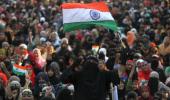The share of the Hindu population declined by 7.8% to 78.06%.
In contrast, the share of the Muslim and Christian populations increased by 43.15% to 14.09%, and by 5.4% to 2.36%.

The share of India's majority Hindu population declined by 7.81 per cent between 1950 and 2015, while that of the Muslim community surged 43.15 per cent in the corresponding period, according to a study published by the Economic Advisory Council to the Prime Minister (EAC-PM).
In the study titled Share of religious minorities: A cross-country analysis, the share of the Hindu population in India declined by 7.8 per cent to 78.06 per cent in this period.
In contrast, the share of the Muslim and Christian population increased by 43.15 per cent to 14.09 per cent, and by 5.4 per cent to 2.36 per cent respectively in the corresponding period.
Similarly, the share of the Sikh and Buddhist populations witnessed an increase to 1.85 per cent and 0.81 per cent respectively during the same period. However, the share of Jains and Parsis in the population mix declined and stood at 0.36 per cent and 0.004 per cent respectively in 2015.
The study conducted by the council clarified that it did not try to figure out why these changes happened, but rather looked at the numbers to see if minorities were getting more or less represented in society.
'India's performance suggests that there is a conducive environment to foster diversity in the society. It is not possible to promote better life outcomes for the disadvantaged sections without providing a nurturing environment and societal support through a bottom-up approach,' the study noted.
'It is not surprising, therefore, that minority populations from across the neighbourhood come to India during times of duress,' the report added.
It found that several neighbouring countries have seen a jump in the population of their majority community. All the Muslim-majority countries have witnessed an increase in the share of the majority religious denomination except the Maldives.
Among the five non-Muslim majority countries, only Sri Lanka and Bhutan saw an increase in the share of the majority populations.
'We are interested in noting the composition of demographic changes in these countries because of their geographical proximity to India. Therefore, any significant fluctuation in their population has a spillover effect on the polity and policies of India,' the report said.
The authors of the study contend that contrary to the noise in several quarters, the data shows that minorities are not just protected but indeed thriving in India and it is particularly remarkable given the wider context within the South Asian neighbourhood where the share of the majority religious denomination has increased and minority populations have shrunk alarmingly across countries like Bangladesh, Pakistan, Sri Lanka, Bhutan and Afghanistan.
Globally, the share of the majority religious denomination has gone down by approximately 22 per cent. The world has become more heterogeneous in the period under study. On every major continent, more countries have seen a decline in the share of the majority religious denomination than an increase.
The study added that the religion associated with the majority group in a country plays an important role in countries that have seen extreme changes.
It notes that of the 20 countries which have seen the maximum increase in the share of the majority religious group between 1950 and 2015, all of these are countries where Christianity or Islam-based denominations were the majority religious group.
On the other hand, the study added that if one focuses on the 20 countries that have seen the maximum decline in the share of the majority religious group, only 3 had Christianity or Islam-based denominations as the majority religious group. Animism was the majority religion in 16 of these countries.












 © 2025
© 2025